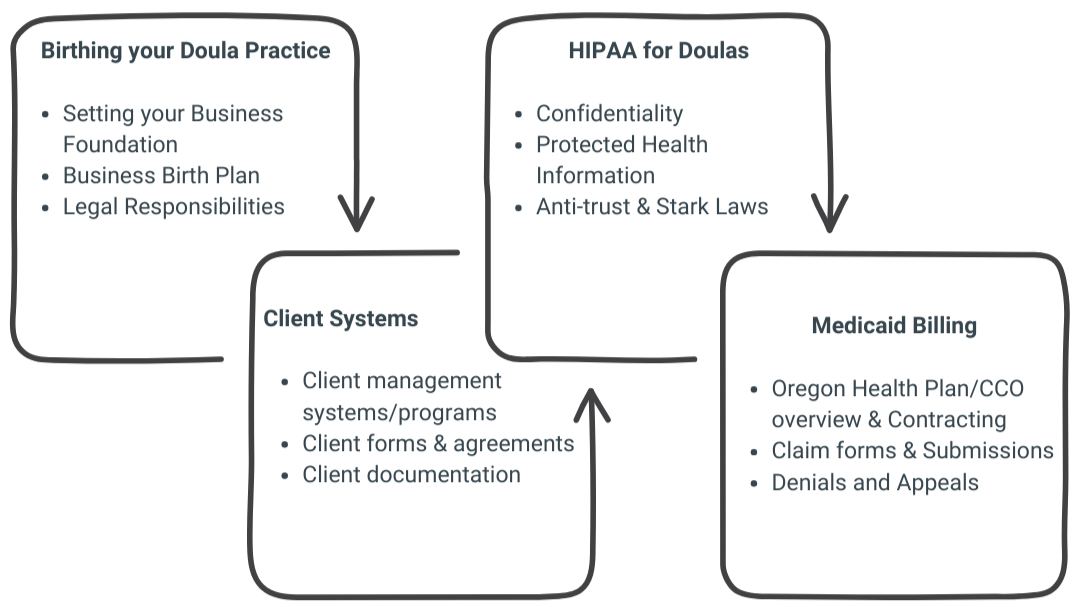Get started with Doula Training Center to become a
Traditional Health Worker Doula!
Our Program
Exceeding the 40-hour minimum contact hours required by the Oregon Health Authority (OHA), our complete comprehensive training is offered in a hybrid training format, so most sessions are live virtual, with several in-person sessions, and some independent study.
Our Foundational Birth Doula Training and THW Preparation Track blends trauma-informed and cultural awareness practices and includes intra-professional collaboration to meet all the training components of the Traditional Health Worker requirements.
At the completion of Track 1, you are certified as a Birth Doula through Doula Training Center.
Track 1: Foundational Labor Doula Training - $1400
Virtually sessions via Zoom are Monday and Tuesday evenings from 5:30-8:30 pm Skills person day is on a Saturday 8:00 AM to 6:00.
2026 Cohorts
Winter: January 19 - March 7
Spring: March 30 - April 25
Mentorship - Free!
You read that right! We do not charge additional fees for the mentorship that we provide to students post trainings.
Why? We’ve observed that less students need on-going mentorship after completing our program, and we’re able to provide personalized guidance when students reach out.
Take any of our courses and you’ll be added to our mentorship circles.
Track 2: THW Doula Preparation
Offered virtually via Zoom Monday and Tuesday evenings from 5:30-7:30 pm.
March 2-10
May 11-19
*Receive a discount when registering for both tracks.
There are no additional or hidden costs like purchasing certification packets or ongoing membership dues. Payment plans are always available to students.
Your Commitments…
Attend a minimum of 90% of course sessions
Complete and present the final project
Complete Training Evaluation
Follow the Code of Ethics and Scope of Practice
Participate in doula functions with respect, compassion, and mutual effort to nourish growth
In Oregon, birth support services provided by Traditional Health Worker Doulas are covered by the Oregon Health Plan.
Steps to become a Traditional Health Worker Doula:
-
Doula Training Center is approved by the Oregon Health Authority.
-
After your training, you will need to attend three births and three postpartum visits to complete the final requirements to apply for the Traditional Health Worker Registry.
-
Once you’ve completed the prior steps and complied all the necessary information, you can submit your application to become a Traditional Health Worker Doula.
-
Once you have received your THW approval, you will need to submit an application to become an Oregon Medicaid Provider.
If you are contracting with a Coordinated Care Organization, you may need to become Credentialed. Each CCO may have their own process. A THW Liaison will be able to provide guidance on thsi process.
What Students Are Saying:
“The knowledge gained from this course and the amount of information taught was the most valuable. I don’t feel I would have received this much education on social determinants of health, culture, and basic maternal and fetal health in any other course.”
— 2024 Spring Cohort Student
“Oh my gosh, it's hard to choose, but probably the hands-on techniques/counter pressure, the bereavement and the business. There was so much information packed in to this class, it was so much more than I was expecting.”
— 2024 Spring Cohort Student
“All of the knowledge, being able to be in person and have those serious conversations but feeling safe to do so. Feeling secure through this course was so helpful, all the instructors really helped you feel like you belonged and that your questions were valid.”
— 2023 Spring Cohort Student
“In person classes were my favorite! Role playing and examples of potential situations were exceptionally helpful!”
— 2022 Fall Cohort Student


